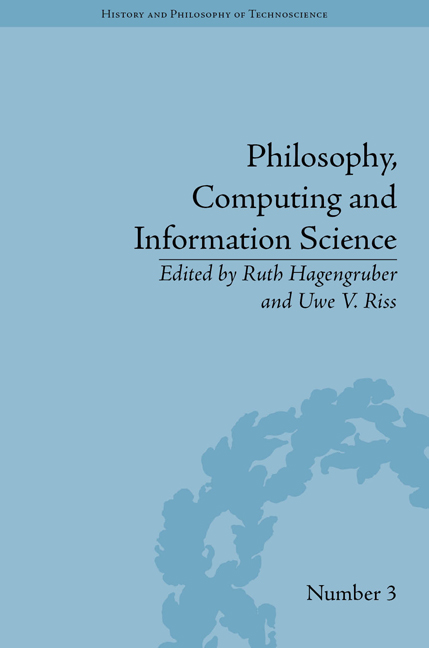Book contents
- Frontmatter
- CONTENTS
- List of Contributors
- List of Figures and Tables
- Introduction: Philosophy's Relevance in Computing and Information Science
- Part I Philosophy of Computing and Information
- Part II Complexity and System Theory
- Part III Ontology
- Part IV Knowledge Representation
- Part V Action Theory
- Part VI Info-Computationalism
- 17 Info-Computationalism and Philosophical Aspects of Research in Information Sciences
- 18 Pancomputationalism: Theory or Metaphor?
- Part VII Ethics
- Notes
- Index
17 - Info-Computationalism and Philosophical Aspects of Research in Information Sciences
from Part VI - Info-Computationalism
- Frontmatter
- CONTENTS
- List of Contributors
- List of Figures and Tables
- Introduction: Philosophy's Relevance in Computing and Information Science
- Part I Philosophy of Computing and Information
- Part II Complexity and System Theory
- Part III Ontology
- Part IV Knowledge Representation
- Part V Action Theory
- Part VI Info-Computationalism
- 17 Info-Computationalism and Philosophical Aspects of Research in Information Sciences
- 18 Pancomputationalism: Theory or Metaphor?
- Part VII Ethics
- Notes
- Index
Summary
Introduction
Historical development has led to the decay of natural philosophy, which until the nineteenth century included all of our knowledge about the physical world, in the growing multitude of specialized sciences, within the ‘Classical Model of Science’. The focus on the in-depth enquiry disentangled from its broad context led to the problem of the loss of a common world view and the impossibility of communication between specialist research fields because of different languages that they developed in isolation. The need for a new unifying framework is becoming increasingly apparent, with information technology enabling and intensifying the communication between different research fields, knowledge communities and information sources. This time, not only natural sciences, but also all of human knowledge is being integrated through a global network such as the internet with its diverse knowledge and language communities.
Info-computationalism (ICON) as a synthesis of pancomputationalism and paninformationalism presents a unifying framework for the understanding of natural phenomena including living beings and their cognition, their ways of processing information and producing knowledge. Within ICON, the physical universe is understood as a network of computational processes on an informational structure. The matter/energy in this model is replaced by information/ computation where information is the structure, whose dynamics are identified as natural computation.
ICON is an example of a philosophical framework in a direct connection with the related scientific fields, and the process is one of mutual exchange: scientific findings influence philosophical thinking, and vice versa.
Information
- Type
- Chapter
- Information
- Philosophy, Computing and Information Science , pp. 201 - 212Publisher: Pickering & ChattoFirst published in: 2014
